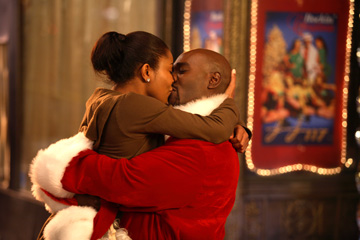Hellboy 2: the Golden Army
Posted on November 9, 2008 at 6:00 pm
 “Hellboy” is the “US Weekly” of comic book sagas. Superheroes are just like us! They squabble with their loved ones! They smoke cigars! They take pregnancy tests! When their hearts are broken they get drunk and sing along to Barry Manilow!
“Hellboy” is the “US Weekly” of comic book sagas. Superheroes are just like us! They squabble with their loved ones! They smoke cigars! They take pregnancy tests! When their hearts are broken they get drunk and sing along to Barry Manilow!
And then there are the other things they do, like confronting a kitten-eating a bag lady who is really a troll and battling a building-sized elemental plant guy who is trying to eat everything. And bursting into flames. And shooting people with very, very big guns and punching people very, very hard with a really, really big hand.
Hellboy (“Red” to his friends) is the big devil-looking red guy with one very large brick-like hand, two sawed-off horns, and a tail. Bad guys do not fluster him. He chews on a cigar, pulls out a gun with bullets bigger than a breadbox, lets out a sigh or a wisecrack, and goes after whatever it is, from a thousand bone-munching spidery-looking little creature to a large, slobbering, boar-shaped monster, and that plant guy. When Hellboy showers, clutching a beer can, we hear the Eels’ “Beautiful Freak,” and the warm acceptance of that song, similar to the “just like us” moments, is a nicely understated theme of the movie.
The creatures and CGI effects are a wonderfully inventive, with the exception of the flames that engulf Hellboy’s true love, Liz (Selma Blair), as lackluster as the “when will she tell him the real reason she is so upset” plotline they’ve given her. She needs to get some flame on pointers from Johnny Storm. But this is not a movie that takes females or their powers very seriously. The other leading lady is Princess Nuala (Anna Walton), a typically Stevie Nicks-type of ethereal beauty with intuitive palm-sensing ability who pretty much stands around when all the fighting is going on.
And what fighting it is. The visuals are sensationally imaginative. Director Guillermo del Toro is every bit as excited about the creatures in this comic-book saga as he was in his grown-up fairy tale “Pan’s Labyrinth.” Wonderfully imagined and intricately constructed, they often reflect the sensibility of a steampunk cracked version of “Lord of the Rings.” Hellboy’s new boss, reported to have an “open face,” turns out to be a clanking robot with a glass dome who speaks through an apparatus that looks like the workings of a Victorian typewriter. The clash and contrast of styles adds a lot of visual flair. A bad guy Prince has long blonde hair and seamed cheeks that make him look like the spawn of Legolas from “Lord of the Rings” and Sally from “A Nightmare Before Christmas.”
The fight scenes are inventively set up and staged. As Hellboy battles the plant guy he has to have one arm around a swaddled infant he is in the process of rescuing. He takes on Victorian typewriter-guy at one point and finds himself battling a barrage of swinging locker doors. When he fights the Prince, he has to be careful to defeat him without hurting him because of the psychic connection that imposes any injuries to him on his twin sister as well. The plot may not be much and the Golden Army of the title is the least interesting of his foes, but even the silly stuff is so imaginatively realized that Hellboy has a bit of a touch of comic book movie heaven.

